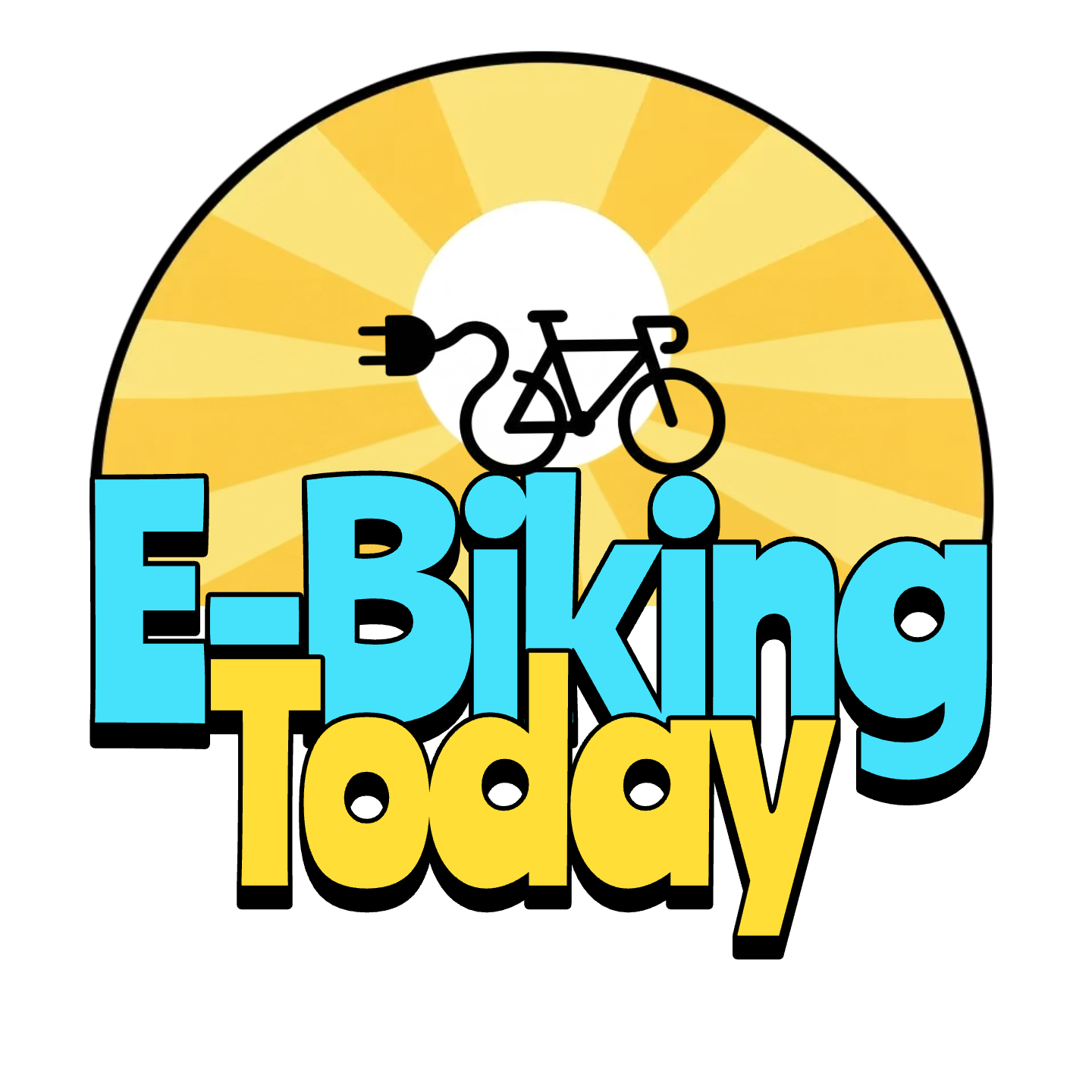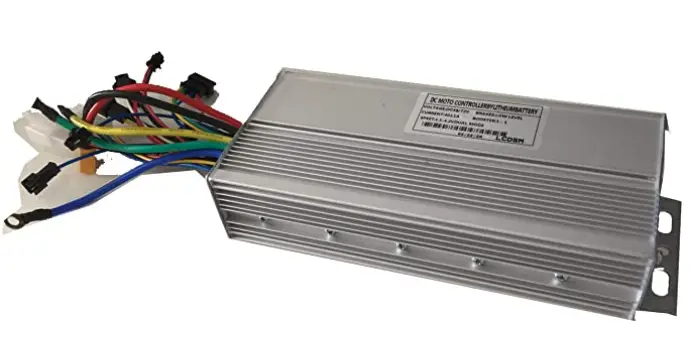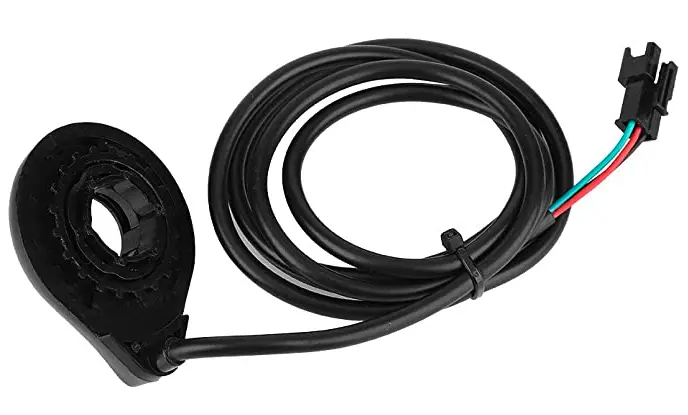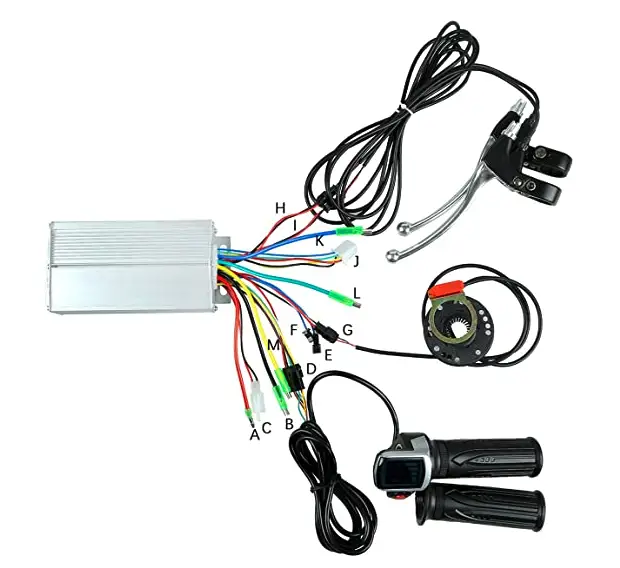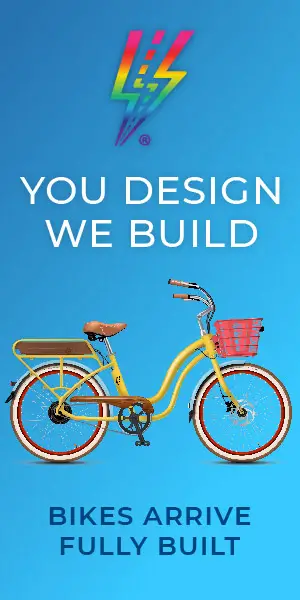Electric bicycles are rapidly becoming more popular and widespread in the modern world. As more people invest in e-bikes, the technology advances, and the variety of products available widens.
The wide variety of electric bike equipment on the market has led many to wonder about a particular component, the dual mode controller. What are these controllers and do you need one?
Dual mode e-bike controllers receive signals from both Hall sensors and non-Hall sensors. An e-bike dual mode controller typically continues to sense motor rotation even if the non-Hall sensors fail. Thus, the motor will continue to work unlike it would with a single mode controller.
There are several types of e-bike controllers, and one that has generated much talk is the dual mode controller. There is little comprehensive information available about this piece of e-bike hardware, so it’s time to shed some light on the subject.
Continue reading and I’ll help you learn what a dual mode electric bike controller is and whether or not you need one.
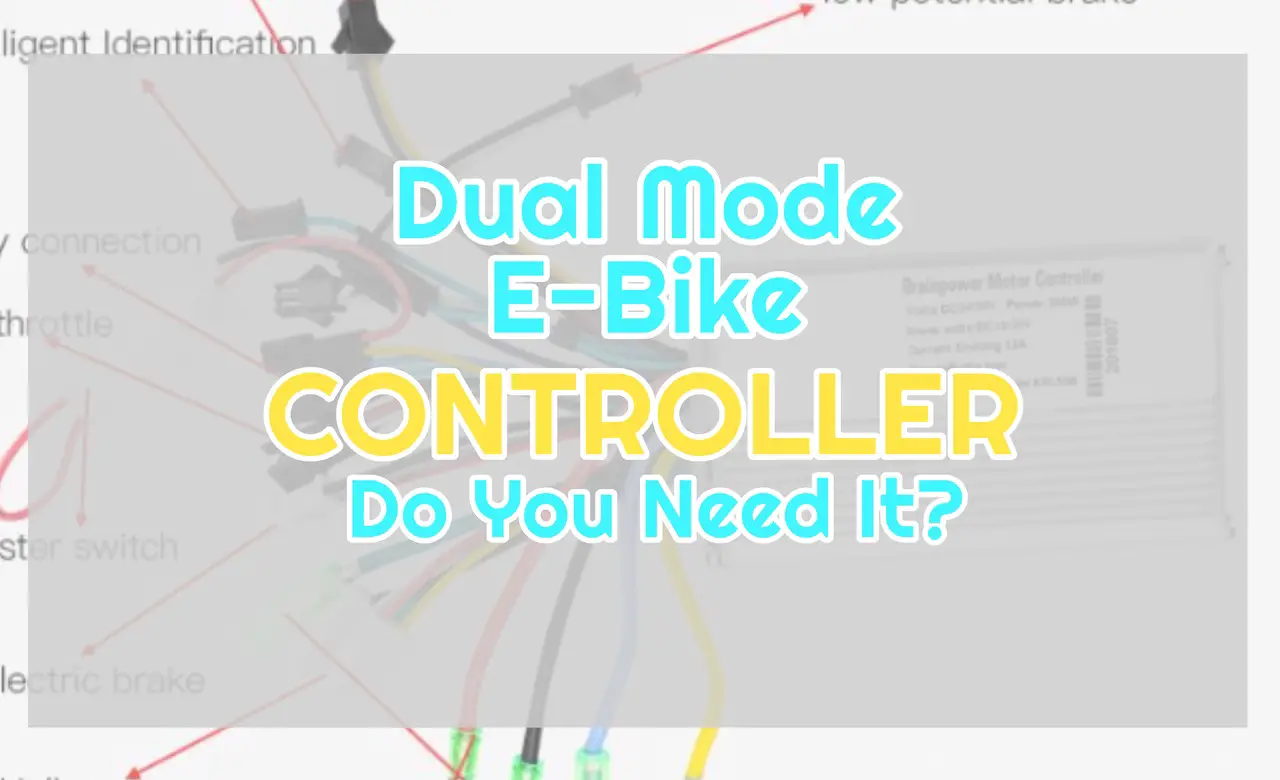
What Is A Dual Mode E-Bike Controller?
In the world of electric bicycles, there are generally two types of controllers that govern all the electric components, including the motor. One of the most popular is a relatively new type of electric bike controller known as a dual mode.
A dual mode electric bike controller is one that is able to function well for motors with and without Hall sensors. If a controller is not dual mode capable, it will only function well with or without a Hall sensor, respectively.
This is a critical feature for a modern electric bike controller. If an electric bike motor is equipped with a Hall sensor, as most brushless dc motors are, and the controller that’s installed onto the e-bike requires these sensors to work, then the motor will fail if the sensor signals fail. This is very likely to happen in due course.
Inversely, if the motor in the e-bike is designed without a Hall sensor, as most brush motors are, it’ll be quite different. If the controller requires a replacement, and a motor that requires a Hall sensor is installed, the controller will not function to control the motor at all.
Specifically, a dual mode controller is one that’ll function well for both types of electric bike motors, whether they are equipped with Hall sensor drive or not.
Having one on your e-bike is ideal if your e-bike has a motor with a Hall effect sensor, as these sensors are very sensitive and likely to break or fail. In case of failure, the controller will then continue to function and effectively control the motor.
If you’re doing an electric bike conversion, your best bet is to build your bike with a motor with Hall sensors and add a controller that is compatible.
Take a look at full conversion kits with dual mode controllers on Amazon.
What Is The Hall Effect?
The Hall effect is often spoken of with regards to e-bike brushless dc motors and we understand that is an important factor to consider. But few of us fully understand it and why it’s important for e-bikes.
The Hall effect is essentially how an electric current affects a magnetic field. Measuring this effect is an excellent way to detect discrepancies within an electrical current and is a highly effective means of detecting and correcting changes within the source of an electric current.
This is, of course, a very over-simplified explanation, but it serves to answer the question as the Hall effect relates to electric bicycles.
Why Is The Hall Effect Important for Electric Bikes?
The Hall effect is important because it is a very effective means of measuring the position of the brushless motor so that the electric bike controller can effectively make adjustments in power at the perfect moment to fully utilize the capabilities of the electric motor.
Hall effect sensors are very small and can fit well within even the smallest e-bike motors. Using these sensors to accurately detect the position of the motor at any given moment is the most efficient way of using the energy that the motor has available.
This efficient use of energy prolongs the expected lifespan of the motor, extends battery life by lowering battery consumption, and provides more power from the motor, as the motor can be used to its full capacity without the unnecessary loss of power.
Hall effect sensors make use of magnets to detect changes in the electrical current passing through the motor and transmit that information to the electric bike controller. It can then make the appropriate adjustments to how the motor is running in order to coax maximum efficiency from the motor.
For this reason, the Hall effect is very important for electric bicycles. Without using this method of electrical detection, e-bikes would not be as fast, powerful, or efficient as they are today.
Do All E-Bike Controllers Have Hall Sensors?
Hall sensors are an important innovation in electric bicycle technology. These sensors have allowed electric bike motors to be more effectively utilized and have made e-bikes more powerful and useable as a result. But do they all have these sensors?
Not all e-bike controllers are equipped with the ability to receive information from a Hall sensor, and not all e-bike motors are equipped with them. Modern brushless electric motors used in e-bikes usually have a Hall sensor while standard brush motors don’t.
Using this type of sensor in electric bike drive systems has not always been the standard. Before these sensors were used, there were other, more ineffective methods of regulating power to the motor and controlling how well it is used. But none of them were as accurate as Hall effect sensors.
Some e-bikes are not equipped with these sensors simply because they aren’t necessary. Many pedal-assist electric bikes don’t require such sophisticated motor management control and so only have a non Hall sensor.
However, the ones that are equipped with both sensors are far more efficient, powerful, and effective than those without.
Learn more about how to add an electric bike controller!
Why Is Dual Mode Necessary For Electric Bike Controllers?
Dual mode controllers are optional for e-bikes, and not always a requirement. Why are these controllers necessary for some electric bicycles and not for others, and what makes them so important?
Dual mode is a name that describes an e-bike controllers’ ability to function with or without a Hall sensor drive to manage the efficiency of the electric motor within the e-bike. This is necessary in case the sensors in a motor fail and provide an electric bike controller that is somewhat universal.
The ability of an e-bike controller to function well for controlling the motor is essential for the operation of the electrical components of the bike. If an electric bike is equipped with a Hall sensor, and those sensors fail, a standard controller will also fail.
However, if the same e-bike is equipped with a dual mode controller and the Hall sensor fails, the controller will continue to function. The functionality of the controller will be somewhat limited, and the system won’t be as efficient, but the e-bike will continue to function without grinding to a halt.
Check out the cost of e-bike controllers on Amazon
These types of motors are necessary to maintain the function of an e-bike that is equipped with Hall effect sensors in the event that the sensors fail. These sensors are known to be fragile and likely to break over time, even with minor accidents or bumps.
If the controller was affected by this, the electric bike wouldn’t function.
The other important reason why dual mode e-bike controllers are necessary is that they unlock the full potential of the motor and electrical system.
Without this type of controller, any sophisticated e-bike will have diminished performance and power capabilities.
How Do Hall Effect Sensors Break?
Hall effect sensors are known to fail. This is why dual mode controllers exist… but what causes this type of sensor to fail so readily?
These sensors are nothing but small magnets that are connected to an electrical circuit. They’re effective because they are delicate. If they were more robust, they wouldn’t be as effective for detecting discrepancies in the electrical currents from the motor.
The delicate nature of Hall effect sensors means that they can be caused to fail by too much jostling, by an electrical surge, or even by wear and tear.
This means that they’re also likely to break far more quickly than other components in an electric bicycle’s electronic system. A large bump or a small accident is likely to cause damage to a Hall sensor signals.
The same is true for a power surge from improperly disconnecting a battery or even from overcharging a battery. These sensors also simply wear out over time.
For these reasons, it’s essential that electric bikes with Hall effect sensors are equipped with dual mode controllers so that the bike will still function when the sensors fail.
Find out how to test an electric bike controller (and how long they should last)!
Hall Effect Vs. Non-Hall Effect Motors
When discussing dual mode electric bike controllers and what they are good for, it’s important to understand the motors that this type of controller is intended to function with. At the end of it, a dual mode electric bike controller is intended to function well with motors that make use of Hall sensor signals.
Motors that are equipped with a hall sensor drive can very accurately detect the position of the motor and send information to the controller. Non-Hall sensor motors do not have these sensors, and so they are not as controllable.
Hall Effect Motors
The dual mode electric bike controller is designed to function with hall sensing motors. These controllers are more sophisticated and offer a greater level of control over the more sophisticated motor.
Motors without hall effect sensors only require the use of single mode controllers. These motors cannot be controlled to the same degree that motors with Hall effect sensors can.
The dual mode controllers that are typically used in conjunction with motors that are equipped with Hall effect sensors have the ability to control the motor even if the sensor signals fail.
This is important because motors that are equipped with these sensors are likely to have component failure at some point in their working lifespan. This is the biggest drawback to using this type of motor.
Non-Hall Effect Motors
Motors without Hall effect sensors are very unlikely to experience component failure unless the motor is damaged. For this reason, these motors can use more standard and less sophisticated controllers.
Bicycle motors that are not equipped with Hall effect sensors are less controllable, as there are fewer methods of controlling the motor due to the lack of measurements taken from the motor to send to the electric bike controller.
This means that these motors are far less powerful, far less efficient, and far less useful than motors that are equipped with Hall effect sensors.
However, the less sophisticated motors are often far more reliable and far more robust. These motors are less likely to sustain damage and thus are very well suited for more rugged or off-road electric bicycles, such as electric mountain bikes and fat tire e-bikes.
Overall, motors with Hall effect sensors are much more powerful, much more useful, and far more efficient than motors without these sensors. This is simply because there is more information sent to the electric bike controller, allowing it to more accurately use the capabilities of the motor, making adjustments as the motor runs.
Dual Mode Vs. Single Mode Electric Bike Controllers: Pros And Cons
Dual mode controllers can be used on motors that are equipped with a hall sensor and those without. These motors are versatile, and they are far more accurate controllers, but there are some drawbacks to using this type of controller.
Single mode controllers are another option. These are less sophisticated, but they have some advantages that dual mode controllers don’t.
You should understand these advantages and disadvantages before doing an e-bike conversion so that you purchase the correct parts. You can find out more in my article about conversion kits.
Let’s compare both types of motors and weigh their pros and cons against one another in order to better understand which is the best motor in which circumstances.
Dual Mode E-Bike Controllers: Pros
Some pros of dual mode controllers (check them out on Amazon) include:
- They better utilize electric motors.
- They are better controllers.
- They can be used for almost any motor.
- They are very versatile.
- They function if a Hall sensor fails.
Dual Mode E-Bike Controllers: Cons
Some cons include:
- They are expensive.
- They are difficult to install.
- They are delicate.
- They have more components that are likely to fail than less sophisticated controllers.
Single Mode Electric Bike Controllers: Pros
Some pros of single mode controllers (check them out on Amazon) include:
- Single mode controllers are simple to use and easy to install.
- They are very robust.
- They can be used on any motor, as long as the correct controller for the motor is used.
- Single mode controllers are affordable.
Single Mode Electric Bike Controllers: Cons
Some cons of single mode controllers include:
- They will not function if a Hall sensor fails.
- They don’t fully utilize electric motors.
- They offer less control.
- Not just any single mode controller can be used with an electric motor.
Conclusion
At the end of it, dual mode controllers are the best type of electric bicycle motor controllers for those who want to get the most from their e-bike.
They are sophisticated and difficult to install, but if you use a brushless motor with a Hall sensor on your e-bike, there is no other motor that will offer more control, performance, or efficiency.
This type of controller will also allow the motor to continue to function if the sensors fail, rather than causing the motor itself to stop functioning.
These controllers are generally the best option for all electric bike enthusiasts.
